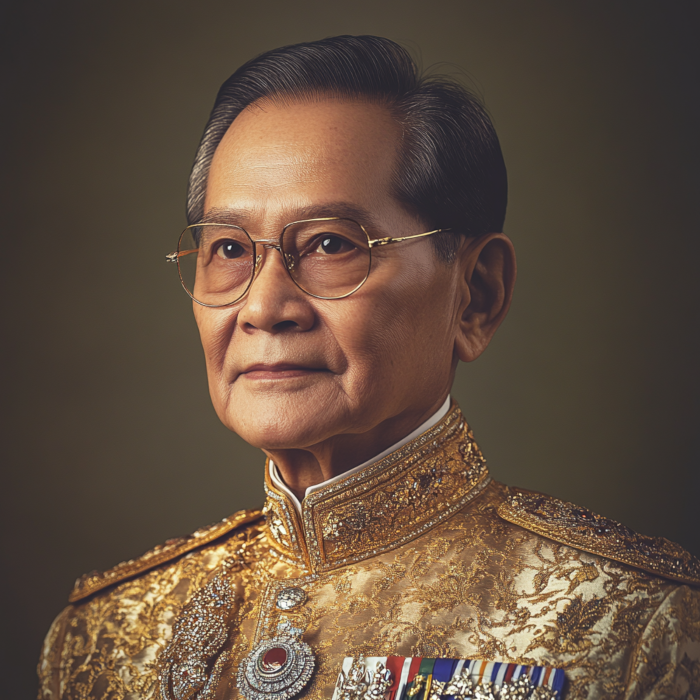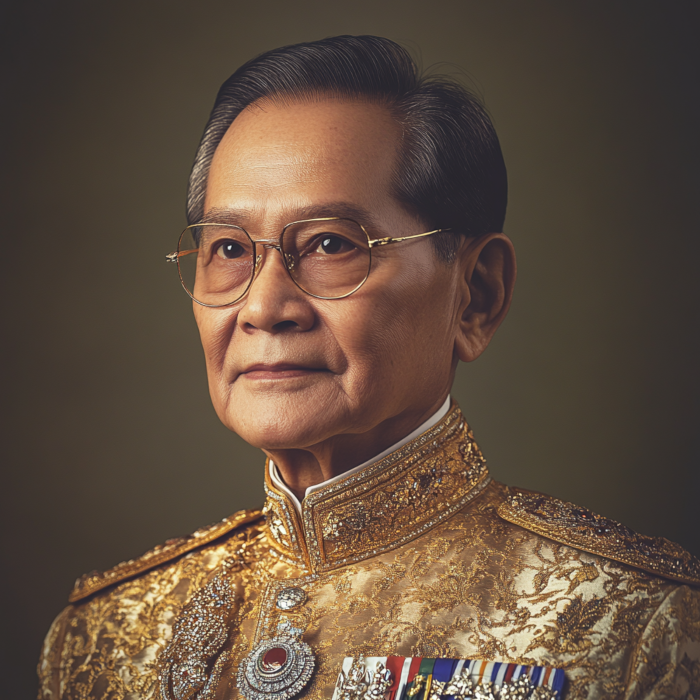


King Bhumibol Adulyadej (1927–2016), also known as Rama IX, was the ninth monarch of Thailand from the Chakri Dynasty and the longest-reigning monarch in Thai history, ruling for over 70 years from 1946 until his death in 2016. He was deeply revered by the Thai people and widely respected both domestically and internationally for his dedication to improving the well-being of his people and stabilizing Thailand through numerous political crises. Bhumibol played a significant role in the country’s development and is remembered as a stabilizing force during periods of economic turmoil, political unrest, and social change.
Birth and Family Background: King Bhumibol Adulyadej was born on December 5, 1927, in Cambridge, Massachusetts, USA, where his father, Prince Mahidol Adulyadej, was studying medicine at Harvard University. His mother, Princess Srinagarindra, came from a noble family, and his father was the son of King Chulalongkorn (Rama V), a revered monarch in Thailand’s history. Bhumibol was the youngest of three children and grew up in a royal family known for its devotion to public service.
Education in Switzerland: After the early death of his father in 1929, the young Bhumibol and his family moved to Switzerland, where he received his education. He studied at prestigious institutions, focusing on science and engineering, and became fluent in several languages, including French, English, and German. His years in Europe exposed him to Western education and values, which would later influence his approach to governance.
Unexpected Ascension: Bhumibol’s older brother, King Ananda Mahidol (Rama VIII), ascended to the throne in 1935 after the abdication of their uncle, King Prajadhipok (Rama VII). However, in 1946, King Ananda Mahidol was found dead under mysterious circumstances, and his death remains an unresolved controversy in Thai history. At the age of 18, Bhumibol unexpectedly became king, a role for which he had not been fully prepared.
Coronation: Bhumibol officially assumed the throne as Rama IX in 1950 after completing his studies in Switzerland. His coronation took place on May 5, 1950, marking the beginning of one of the most significant reigns in modern Thai history. Shortly before his coronation, Bhumibol married Queen Sirikit, who became his lifelong companion and played a crucial role in his public image and royal duties.
Symbol of Stability: Over the course of his long reign, King Bhumibol became a symbol of stability and continuity in Thailand, a country that experienced numerous political crises, military coups, and constitutional changes. Although the Thai monarchy is constitutionally a symbolic institution with limited formal political power, Bhumibol wielded considerable moral authority and influence behind the scenes. His calm, measured presence was a key factor in maintaining national unity during times of uncertainty.
Mediating Political Crises: Thailand saw over a dozen successful and attempted military coups during Bhumibol’s reign, but he was often able to mediate conflicts and maintain a semblance of stability. Notably, during the 1973 student uprising against military dictatorship and the bloody crackdown that followed, Bhumibol intervened to prevent further violence, and his intervention helped transition Thailand toward democracy in the late 1970s. Similarly, during the 1992 Black May political protests, his televised meeting with military and opposition leaders helped defuse a violent confrontation and restore civilian rule.
Relationship with the Military: Throughout his reign, King Bhumibol maintained a delicate relationship with the military, which held significant power in Thai politics. While he occasionally supported military leaders, he also encouraged democratic reforms. His relationship with military dictators like Field Marshal Sarit Thanarat in the late 1950s and 1960s was pragmatic, as he worked with them to implement his development projects, but he never fully relinquished his authority or moral influence over the country's direction.
Rural Development and "Sufficiency Economy": One of King Bhumibol’s most significant contributions was his focus on rural development and poverty alleviation. He initiated thousands of Royal Development Projects aimed at improving agriculture, water management, education, and health care in Thailand’s rural areas. His approach emphasized self-reliance and sustainability, most notably through his philosophy of the "Sufficiency Economy," which promoted balanced, sustainable development and moderation in economic practices.
Bhumibol believed that Thailand’s economic growth should be inclusive and beneficial to all sectors of society, particularly the rural poor. His philosophy of sufficiency economy gained global recognition during the 1997 Asian Financial Crisis when Thailand was heavily affected. His ideas promoted economic resilience and self-sufficiency in the face of globalization and economic shocks.
Environmental and Agricultural Innovations: King Bhumibol was also an early advocate of environmental conservation and sustainable agriculture. He developed numerous initiatives related to reforestation, soil erosion prevention, and water conservation. He personally involved himself in technical projects, such as designing water pumps, and supported research into agricultural innovations like alternative crops and soil improvement techniques. His hands-on approach earned him the respect of farmers and rural communities, who saw him as a practical and benevolent monarch.
"Father of the Nation": King Bhumibol was deeply revered by the Thai people, who saw him as a compassionate and selfless leader dedicated to their well-being. He was often referred to as the "Father of the Nation" due to his paternal image and the deep personal connection he fostered with his subjects. He frequently toured the country, visiting rural areas, speaking with farmers, and showing a personal interest in their lives and problems. These visits, often conducted with little fanfare, helped reinforce his image as a king who was truly in touch with his people.
Charitable and Religious Role: In addition to his development projects, King Bhumibol was active in charitable and religious endeavors. As a devout Buddhist, he supported Buddhist education, temple restoration, and religious festivals. His deep connection with Thailand’s Buddhist heritage enhanced his standing as a moral leader and added to his legitimacy as the spiritual head of the nation.
Criticism and Political Role: While King Bhumibol was widely revered, his reign was not without controversy. His close relationship with the military during the early years of his reign, particularly during the authoritarian periods of the 1950s and 1960s, drew criticism from some political activists and intellectuals. Critics also pointed out that the royal family’s immense wealth and influence were rarely questioned, and the Thai monarchy remained protected by strict lèse-majesté laws, which criminalized any criticism of the king or royal family.
Lèse-Majesté Laws: The monarchy was insulated from criticism by some of the strictest lèse-majesté laws in the world. These laws prohibited any public criticism of the king and the royal family, leading to the prosecution and imprisonment of individuals for even mild or ambiguous remarks about the monarchy. While the laws were intended to protect the king’s dignity, they were often used to suppress political dissent and curb free speech. The existence of these laws, along with the cult-like reverence for the king, led to a lack of transparency and open debate about the role of the monarchy in Thai society.
Health Problems and Decline: In his later years, King Bhumibol’s health deteriorated, and he was frequently hospitalized. He made fewer public appearances and largely retreated from active governance, though he remained a unifying figure in the background. His prolonged absence from public life led to growing concerns about the future of the monarchy, particularly as political instability continued to affect the country.
Death and National Mourning: King Bhumibol Adulyadej passed away on October 13, 2016, at the age of 88. His death plunged the nation into deep mourning, and millions of Thais paid their respects at the Grand Palace in Bangkok. His funeral, held in October 2017, was an elaborate and deeply symbolic event that reflected the immense reverence the Thai people held for their king. The country observed a year of mourning, during which time the people dressed in black and participated in various memorial activities to honor his legacy.
Legacy: King Bhumibol is remembered as one of the most beloved and influential monarchs in Thai history. His emphasis on rural development, his personal connection with the people, and his ability to mediate political crises helped ensure the stability of the country during turbulent times. While his reign was marked by political and economic challenges, he managed to retain the loyalty and affection of the Thai people, who saw him as a symbol of unity, stability, and compassion.
Succession: Upon his death, King Bhumibol was succeeded by his only son, Crown Prince Maha Vajiralongkorn, who ascended the throne as King Rama X. Vajiralongkorn’s succession was met with mixed reactions, as he did not share the same level of popularity as his father, and his personal life had been the subject of public scrutiny. Nonetheless, the new king has continued to preside over Thailand’s constitutional monarchy, though under different circumstances and with different challenges than his father faced.
King Bhumibol Adulyadej’s reign profoundly shaped the trajectory of modern Thailand. Revered for his development projects, his moral authority, and his role as a stabilizing force during decades of political upheaval, Bhumibol left behind a complex legacy. His efforts to modernize the country and improve the lives of the poor earned him immense respect, while his role in mediating political crises helped to maintain peace and unity. Despite controversies surrounding the monarchy’s political influence and the use of lèse-majesté laws, King Bhumibol remains a beloved figure in Thailand’s national consciousness, remembered as a fatherly figure who guided the nation through its most challenging times.

We use cookies
We use cookies and other tracking technologies to improve your browsing experience on our website, to show you personalized content and targeted ads, to analyze our website traffic, and to understand where our visitors are coming from. Privacy Policy.